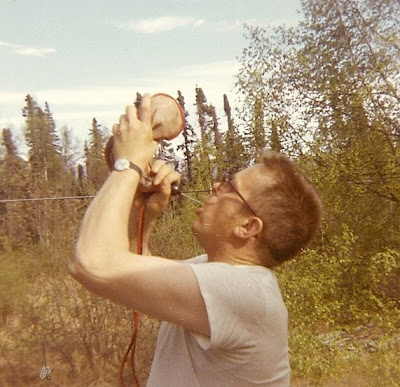The Christmas of 1967 was especially difficult for Wes. He told me that he had married the prettiest girl in school, thought it was a happy union, but surprisingly found it to be illusion. He dropped everything and came to Alaska after they broke up. One morose evening he told me that he considered his life to be over. That thought proved to be false; life had just taken a new direction for him.
 Bill Smith, Tim, & Wes Warner, Big Lake, AK, Septermer, 1967
Four of us had driven north to Big Lake the preceding September. That had been the extent of our exploration till May when Wes and I took an impromptu trip to Homer and Kachemak Bay. During the summer we tried our hand at fishing, but often found the streams to be “sterile” - our way of justifying fishless returns. We had yet to learn the ways of fishing in Alaska; that waters could be full of fish at certain times of the year and empty at others.
Bill Smith, Tim, & Wes Warner, Big Lake, AK, Septermer, 1967
Four of us had driven north to Big Lake the preceding September. That had been the extent of our exploration till May when Wes and I took an impromptu trip to Homer and Kachemak Bay. During the summer we tried our hand at fishing, but often found the streams to be “sterile” - our way of justifying fishless returns. We had yet to learn the ways of fishing in Alaska; that waters could be full of fish at certain times of the year and empty at others.
Wes Warner fishing the Sisitna River, AK 1968
One weekend, while fishing down on the Kenai, we decided to try the Lower Russian Lake. We’d heard that it had some nice Rainbow trout. It was a bit late on a Sunday afternoon, after another fruitless day without fish. We started up the three mile-long trail with nothing but fishing poles in hand. I don‘t remember much about the trek other than it was a nice sunny day, and we walked along at a brisk pace. It probably took a hour to walk in; we fished for no more than an hour, and then walked back out - shows how determined and desperate fishermen can get.
Joe Buckingham with Pink Salmon on the Sussitna River, Ak, 1968
Mom and Dad drove the Alcan the following summer, 1968. They arrived in mid -June and stayed several weeks. We flew up to Kotzebue and Nome on Alaska Airlines during the Solstice. Mom and I were having a beer at the local saloon in Nome when I went out to take a photo of Main Street at midnight. Later the three of us walked an ice field at Portage Glacier, drove a very rough road to Lake Louise, and then fished for Red Salmon on the Russian River. They had a memorable time, and reluctantly headed back in July.
Mom and Dad at signpost in Nome, AK, 1968
Dad and Mom left their small travel trailer with me to sell as they did not wish to tow it back to Indiana. I sold it to a couple, that had just arrived in Alaska. I remember they were in their forties, had just obtain jobs in the boom town of Kenai, and were excited about starting a new life. The price was $900 dollars, they paid $300 down and were to make two monthly payments of equal size. The next payment did not arrive as promised, so I had to drive down to Kenai to look them up. I found his wife working as a waitress in a popular bar, and she went and got him. His arm was in a cast. He had a accident shortly after beginning work, and they were up against it. The trailer was in a local park, and his mother was living with them.
Mom and Dad on Snow field, Poertage Glazier, 1968
Dad with Red Salmon catch, Kenia Peninsula, AK, 1968
Mom with her first Red Salmon, Russian River, AK, 1968
I had borrowed Bill Smith’s truck and driven the hundred and sixty miles to Kenai thinking I might be taking it back with me, but I didn’t have the heart to put them in the street. I had a potential sale lined up with a contractor in Anchorage, but told the guy I didn’t want to do that if he would make the two final installments. I gave him another month. I did not tell him I was heading back to Indiana in a couple weeks. Both payments arrived on time.
GO TO: Buying a House and other adventrues with Wes, Part 4




























